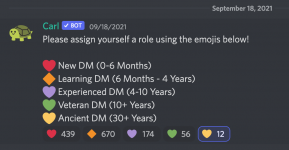Who had the authority to say, though? Did you, as GM, retain the ability to say no?
No? I granted the player half of the slates to be whatever they wanted. The only restrictions are that some things are level gated (you have to be 7th level to cast
wall of fire, but it can be available when you get there), and that it had to fit the theme of an efreet's treasure. The PCs took out a powerful creature that was teaching villains fire magic. These seven bronze tablets just needed to fit the theme, and have a couple things written on them to point towards another adventure. Which the PCs could engage with or not, as they decided. I mean I guess I could have said "No", there isn't any kind of legal contract involved. But the first rule at my table is "don't be a jerk", and to take something back would be kind of mean.
Apparently giving the players this level of choice is inadequate, and is a domineering practice. A few rounds of that make me disinclined to discuss my play style further, especially when I show the thread to my players and ask "am I doing something wrong? Do you want to make greater contributions? Am I stifling your creativity?" "No, we're good and having a great time", is the reply I receive. So, I think I'm good.
What the point here is to point out the structure of authority and discuss that -- who has it when?
I attempted to engage that conversation to see what I could learn. But, I think we've moved past that. I like to think that I have a collaborative game. But it's a persistent game that has been in the same world for years. It is absolutely a curated environment. The histories are peppered with the achievements of past players, which have changed the course of history, otherwise. I make absolutely no apologies for that, and it is an aspect of wonder and appreciation in that the
players know they may get to make a permanent mark in my campaign. They get to be a part of history, however fictional.
There are other structures where players have authorities over more than their PCs; where the GM is constrained by player declarations in ways that would be quite foreign to someone only familiar with D&D and games that structure their authorities like D&D (BRP, CoC, WoD, etc). There are other ways, and they do work.
Glad to hear it. Someone could start a thread on useful parts of other systems that might enhance the D&D experience. I pretty much only run D&D, maybe one day FATE, and have had long-standing, torrid affairs with Traveler and RQ. Picked up Lancer a few months ago, very interesting game. But is this particular sub-forum I'm looking for interesting ideas to add to D&D.



